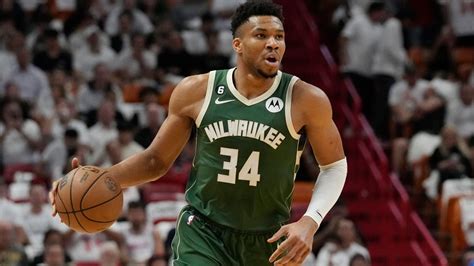
The Milwaukee Bucks are reportedly preparing for the possibility of trading Giannis Antetokounmpo if he doesn’t sign an extension by the start of the upcoming season, a scenario that has sent shockwaves through the NBA. Faced with the potential of losing the two-time MVP for nothing, the Bucks’ ownership is said to be aligned on exploring trade options to maximize their return, according to a report by Yahoo Sports.
The decision, though drastic, reflects the organization’s determination to avoid a repeat of situations where star players leave in free agency without compensation. This development follows a disappointing first-round exit in the playoffs against the Miami Heat despite being the top seed in the Eastern Conference, a result that led to the firing of head coach Mike Budenholzer and the hiring of Adrian Griffin. The potential trade of a generational talent like Antetokounmpo would reshape the league landscape and significantly impact the Bucks’ future.
The impetus for this shift is rooted in the Bucks’ desire to control their destiny. “The Bucks are operating under the possibility that this is Giannis’ last season in Milwaukee and that they will have to consider the viability of trades involving Antetokounmpo if an extension is not reached,” Yahoo Sports reported. This proactive approach signifies a major departure from simply hoping Antetokounmpo remains committed to the franchise long-term.
The Bucks find themselves in a precarious position. Antetokounmpo, who is eligible to sign a three-year extension this offseason, holds considerable leverage. His decision will dictate the direction of the franchise. The Bucks are acutely aware of the potential consequences of failing to secure his commitment, particularly given recent examples of star players leveraging free agency to join other teams, leaving their former teams empty-handed.
The specter of losing Antetokounmpo for nothing looms large. The Bucks witnessed firsthand the impact of a disgruntled superstar when they lost Ray Allen in 2007 and, while that was different, the prospect of losing Antetokounmpo without compensation is far more devastating. This drives the urgency to explore trade scenarios if an extension isn’t agreed upon. The franchise understands the value of securing assets, even if it means parting ways with a player of Antetokounmpo’s caliber.
The ripple effects of a potential Antetokounmpo trade would be immense. Numerous teams would line up to acquire the services of a player widely considered one of the league’s best. This would inevitably trigger a bidding war, potentially yielding a substantial return for the Bucks. The assets acquired could then be used to rebuild the team or acquire other star players to remain competitive. However, trading Antetokounmpo would also represent a significant setback for the Bucks, who have built their identity around him.
The decision to consider trading Antetokounmpo represents a high-stakes gamble for the Bucks. It underscores the evolving dynamics of player empowerment in the NBA and the challenges teams face in retaining their star players. The Bucks’ proactive stance reflects a growing trend among NBA franchises to prioritize asset management and control their own narrative rather than passively waiting for players to dictate their fate. The next few months will be critical in determining Antetokounmpo’s future and the direction of the Bucks’ franchise.
The situation also highlights the immense pressure on the Bucks’ new head coach, Adrian Griffin. He inherits a team facing uncertainty and must quickly establish a strong rapport with Antetokounmpo to convince him that Milwaukee remains the best place for him to contend for championships. Griffin’s ability to connect with Antetokounmpo and demonstrate a compelling vision for the team’s future will be crucial in persuading him to commit long-term.
The timing of this report is also noteworthy. It coincides with the start of the offseason, when teams are actively exploring their options and strategizing for the upcoming season. The Bucks’ decision to publicly consider trading Antetokounmpo could be interpreted as a strategic move to pressure him into signing an extension. It also serves as a signal to other teams that they are prepared to explore all avenues to secure the franchise’s future.
The move is also influenced by the changing landscape of the NBA and the increasing frequency of player movement. Superstars like Kevin Durant, Kyrie Irving, and Kawhi Leonard have all changed teams in recent years, demonstrating the willingness of players to seek out new opportunities. The Bucks are aware that Antetokounmpo could follow a similar path, and they are determined to be proactive in managing that possibility.
Ultimately, the decision rests with Antetokounmpo. He has the power to shape his own destiny and determine the future of the Bucks. His decision will not only impact the Bucks but also the entire NBA landscape. The coming weeks will be filled with speculation and anticipation as the basketball world awaits Antetokounmpo’s decision. The pressure is on the Bucks to convince him to stay, but they are also prepared to act decisively if he chooses to explore other options.
The Bucks’ reported willingness to trade Antetokounmpo represents a pivotal moment in the franchise’s history. It highlights the challenges of building and maintaining a championship contender in the modern NBA. The outcome of this situation will have far-reaching consequences for the Bucks, Antetokounmpo, and the entire league. The situation will undoubtedly be closely monitored by teams and fans alike.
The situation also brings into question the overall direction of the franchise. While the hiring of Adrian Griffin signaled a commitment to a new vision, the potential trade of Antetokounmpo suggests a willingness to consider a complete rebuild. This uncertainty could impact the morale of other players on the team and make it more difficult to attract free agents in the future.
The Bucks must also consider the potential impact on their fan base. Antetokounmpo is not only a superstar player but also a beloved figure in the Milwaukee community. Trading him would be a difficult decision to justify to fans who have embraced him as one of their own. The Bucks would need to carefully manage the public relations fallout from such a move.
The potential trade also raises questions about the future of the NBA. The increasing power of players has made it more difficult for teams to maintain long-term stability. The Bucks’ situation highlights the challenges of building a championship team in an era of player empowerment. It remains to be seen whether the league will take steps to address this imbalance of power.
The Bucks’ decision also reflects a growing trend among NBA teams to prioritize asset management over sentimental attachment. In the past, teams may have been more reluctant to trade a superstar player, even if it meant losing them for nothing in free agency. However, the increasing financial stakes of the NBA have made teams more willing to make difficult decisions to protect their long-term interests.
The coming weeks will be a crucial test for the Bucks’ management team. They must navigate a complex and sensitive situation with the potential to reshape the franchise’s future. Their ability to communicate effectively with Antetokounmpo, other players, and the fan base will be critical in determining the outcome.
The situation also underscores the importance of building a strong organizational culture. Teams that have a positive and supportive environment are more likely to retain their star players. The Bucks must create an environment that makes Antetokounmpo feel valued and appreciated.
The potential trade of Antetokounmpo would have a significant impact on the Eastern Conference. It would create a power vacuum at the top of the conference and open the door for other teams to contend for the championship. Teams like the Boston Celtics, Philadelphia 76ers, and Miami Heat would all benefit from Antetokounmpo’s departure.
The situation also raises questions about the future of small-market teams in the NBA. It has become increasingly difficult for small-market teams to compete with larger-market teams that have more resources and appeal to free agents. The Bucks’ situation highlights the challenges of building a championship team in a small market.
The Bucks must also consider the potential impact on their reputation. Trading Antetokounmpo would be viewed by some as a sign of failure. The Bucks would need to work hard to rebuild their reputation and convince other players to join the team.
The situation is a reminder that the NBA is a business. Teams are constantly evaluating their options and making decisions based on what they believe is in their best interests. The Bucks’ decision to consider trading Antetokounmpo is a business decision, plain and simple.
The potential trade of Antetokounmpo would be a major loss for the city of Milwaukee. He has become a symbol of the city and its resurgence. Trading him would be a blow to the city’s morale.
The Bucks must also consider the potential impact on their sponsors. Antetokounmpo is one of the most marketable players in the NBA. Trading him would likely result in a loss of sponsorship revenue.
The situation is a reminder that anything can happen in the NBA. Even the most successful teams can face unexpected challenges. The Bucks’ situation highlights the unpredictable nature of the league.
The Bucks must also consider the potential impact on their ticket sales. Antetokounmpo is a major draw for fans. Trading him would likely result in a decrease in ticket sales.
The situation is a reminder that the NBA is a competitive league. Teams are constantly striving to improve their rosters and compete for championships. The Bucks’ decision to consider trading Antetokounmpo is a sign that they are not satisfied with their current situation.
The Bucks must also consider the potential impact on their merchandise sales. Antetokounmpo is one of the most popular players in the NBA. Trading him would likely result in a decrease in merchandise sales.
The situation is a reminder that the NBA is a global league. Players from all over the world are competing for championships. The Bucks’ situation highlights the international appeal of the league.
The Bucks must also consider the potential impact on their future draft picks. Trading Antetokounmpo would likely result in a loss of draft picks.
The situation is a reminder that the NBA is a constantly evolving league. Teams are constantly adapting to new trends and strategies. The Bucks’ decision to consider trading Antetokounmpo is a sign that they are willing to adapt to the changing landscape of the league.
The Bucks must also consider the potential impact on their coaching staff. Trading Antetokounmpo would likely result in changes to the coaching staff.
The situation is a reminder that the NBA is a demanding league. Players and coaches are constantly under pressure to perform. The Bucks’ situation highlights the pressures of competing at the highest level.
The Bucks must also consider the potential impact on their front office. Trading Antetokounmpo would likely result in changes to the front office.
The situation is a reminder that the NBA is a rewarding league. Players and coaches who achieve success are handsomely rewarded. The Bucks’ situation highlights the rewards of competing at the highest level.
The Bucks must also consider the potential impact on their community involvement. Antetokounmpo is actively involved in the Milwaukee community. Trading him would likely result in a decrease in community involvement.
The situation is a reminder that the NBA is a powerful league. The league has the power to shape communities and inspire people around the world. The Bucks’ situation highlights the power of the NBA.
The Bucks must also consider the potential impact on their legacy. Trading Antetokounmpo would likely tarnish their legacy.
The situation is a reminder that the NBA is a special league. The league is filled with talented players, passionate fans, and dedicated coaches. The Bucks’ situation highlights the special nature of the NBA.
The team has until the start of the season to convince Antetokounmpo to sign an extension. If he doesn’t, expect the Bucks to aggressively pursue trade options to avoid the nightmare scenario of losing him without any return. The future of the Milwaukee Bucks hangs in the balance.
Frequently Asked Questions (FAQs)
-
Why are the Bucks considering trading Giannis Antetokounmpo?
The Bucks are considering trading Giannis Antetokounmpo because they are worried about losing him for nothing in free agency. According to the Yahoo Sports report, “The Bucks are operating under the possibility that this is Giannis’ last season in Milwaukee and that they will have to consider the viability of trades involving Antetokounmpo if an extension is not reached.” They want to avoid a situation where he leaves without them receiving any compensation in return. This preemptive measure is designed to maximize the team’s assets and control their future direction, rather than passively hoping Antetokounmpo remains committed to the franchise long-term. The failure to advance past the first round after having the best regular season record further exacerbates this concern.
-
What are the potential trade destinations for Giannis Antetokounmpo?
While no specific destinations were mentioned in the source article, teams with ample assets and a need for a superstar would likely be interested. Teams such as the New York Knicks, who have a history of pursuing star players and possess valuable draft capital and young talent, the Los Angeles Lakers, who could pair him with Lebron James, or the Golden State Warriors, who could potentially offer a package including young players and draft picks, could all be potential suitors. Other teams with significant cap space and attractive young players would also be in the mix. Ultimately, the potential destinations would depend on the Bucks’ desired return package and Antetokounmpo’s willingness to commit to a new team long-term. The article only focused on the Bucks potential actions and didn’t speculate on other teams.
-
What impact would a Giannis Antetokounmpo trade have on the NBA?
A Giannis Antetokounmpo trade would have a seismic impact on the NBA, dramatically reshaping the competitive landscape. His departure would create a power vacuum in the Eastern Conference, opening the door for other teams to contend for the championship. It would also significantly alter the balance of power between conferences, potentially creating a new dynasty if he were to join a team in the Western Conference. Furthermore, the trade would trigger a bidding war among teams vying for his services, resulting in a massive haul of assets for the Bucks and potentially setting a new precedent for superstar trades in the league. The repercussions would be felt throughout the NBA, impacting team strategies, player movement, and the overall competitive balance.
-
What does this mean for the Bucks’ future?
A Giannis Antetokounmpo trade would signal a significant shift in the Bucks’ future, potentially initiating a rebuild. While acquiring valuable assets in return, such as draft picks and promising young players, it would also mean parting ways with the cornerstone of their franchise and a player who has defined their identity for years. The team would need to embark on a new path, focusing on developing young talent and building a new core. The process could take several years, but the acquired assets could provide a foundation for long-term success. The Bucks would need to carefully manage the transition and reassure their fan base that they are committed to building a competitive team in the future. Conversely, keeping Antetokounmpo solidifies the Bucks as immediate contenders, provided they can build a supporting cast around him.
-
What is Giannis Antetokounmpo’s current contract situation?
Giannis Antetokounmpo is eligible to sign a three-year extension this offseason. The decision of whether or not he signs this extension will be a pivotal point for both him and the Bucks.









